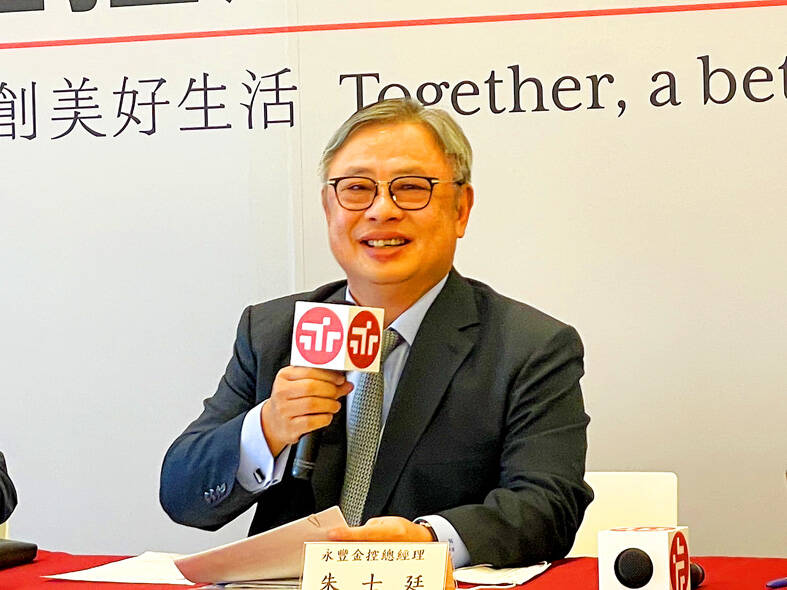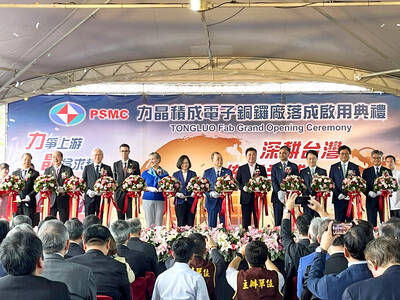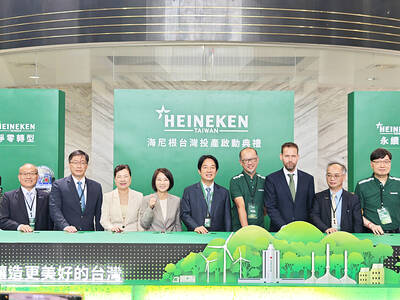SinoPac Financial Holdings Co (永豐金控) is confident in the local banking sector’s health as global financial sector fears are easing and most local bank deposits have been insured by Central Deposit Insurance Corp (CDIC), company president Stanley Chu (朱士廷) told an investors’ conference in Taipei yesterday.
One of the reasons the recent US bank failures have caused panic is because most of the deposits are not insured by the US Federal Deposit Insurance Corp (FDIC), Chu said.
The FDIC’s deposit guarantees are capped at US$250,000 per account, and about 86 percent of Silicon Valley Bank’s deposits were uninshured, he said.

Photo: Kelson Wang, Taipei Times
In Taiwan, the CDIC offers maximum insurance coverage of NT$3 million (US$98,733) per depositor, and 98 percent of local bank deposits are under that threshold, so most depositors are covered, Chu said.
Taiwan’s banks have good capital adequacy and relatively few non-performing loans, he said.
“There is a slim chance that local banks would experience the same crisis as the American banks did,” he added.
Last year, SinoPac Financial had the highest return on equity (ROE) among its local peers at 10.1 percent, the company said yesterday.
ROE, calculated by dividing net income by shareholders’ equity, indicates how efficiently a company is generating profit. The company ranked 10th among local financial holding firms in 2019 when its ROE stood at 8.6 percent.
Interest rate hikes in Taiwan and the US pushed the company’s net interest income up by 22 percent year-on-year to NT$26.9 billion last year, SinoPac Financial said.
The company’s net fee income plunged 18 percent last year, causing its total net profit to drop 1.5 percent from a year earlier to NT$15.96 billion, it said.
Its banking arm, Bank SinoPac (永豐銀行), generated net profit of NT$14.72 billion last year, accounting for 92 percent of the company’s total profit, and its securities unit, SinoPac Securities Co (永豐金證券), made up the rest, company data showed.
This year, Bank SinoPac plans to use a freshly raised NT$10 billion to boost its capital adequacy instead of using it for investment or expansion, due to economic uncertainties, it said.
“Most local financial holding companies with a focus on the insurance business had a difficult time last year, and are facing tighter accounting rules going forward,” Chu said. “As a result, we are cautious about the insurance business and will not consider merger and acquisition activities with an insurance company.”

ARTIFICIAL INTELLIGENCE: The chipmaker last month raised its capital spending by 28 percent for this year to NT$32 billion from a previous estimate of NT$25 billion Contract chipmaker Powerchip Semiconductor Manufacturing Corp (力積電子) yesterday launched a new 12-inch fab, tapping into advanced chip-on-wafer-on-substrate (CoWoS) packaging technology to support rising demand for artificial intelligence (AI) devices. Powerchip is to offer interposers, one of three parts in CoWoS packaging technology, with shipments scheduled for the second half of this year, Powerchip chairman Frank Huang (黃崇仁) told reporters on the sidelines of a fab inauguration ceremony in the Tongluo Science Park (銅鑼科學園區) in Miaoli County yesterday. “We are working with customers to supply CoWoS-related business, utilizing part of this new fab’s capacity,” Huang said, adding that Powerchip intended to bridge

purpose: Tesla’s CEO sought to meet senior Chinese officials to discuss the rollout of its ‘full self-driving’ software in China and approval to transfer data they had collected Tesla Inc CEO Elon Musk arrived in Beijing yesterday on an unannounced visit, where he is expected to meet senior officials to discuss the rollout of "full self-driving" (FSD) software and permission to transfer data overseas, according to a person with knowledge of the matter. Chinese state media reported that he met Premier Li Qiang (李強) in Beijing, during which Li told Musk that Tesla's development in China could be regarded as a successful example of US-China economic and trade cooperation. Musk confirmed his meeting with the premier yesterday with a post on social media platform X. "Honored to meet with Premier Li

Dutch brewing company Heineken NV on Friday announced an investment of NT$13.5 billion (US$414.62 million) over the next five years in Taiwan. The first multinational brewing company to operate in Taiwan, Heineken made the statement at a ceremony held at its brewery in Pingtung County. It also outlined its efforts to make the brewery “net zero” by 2030. Heineken has been in the Taiwanese market for 20 years, Heineken Taiwan managing director Jeff Wu (吳建甫) said. With strong support from local consumers, the Dutch brewery decided to transition from sales to manufacturing in the country, Wu said. Heineken assumed majority ownership and management rights

Microsoft Corp yesterday said that it would create Thailand’s first data center region to boost cloud and artificial intelligence (AI) infrastructure, promising AI training to more than 100,000 people to develop tech. Bangkok is a key economic player in Southeast Asia, but it has lagged behind Indonesia and Singapore when it comes to the tech industry. Thailand has an “incredible opportunity to build a digital-first, AI-powered future,” Microsoft chairman and chief executive officer Satya Nadella said at an event in Bangkok. Data center regions are physical locations that store computing infrastructure, allowing secure and reliable access to cloud platforms. The global embrace of AI